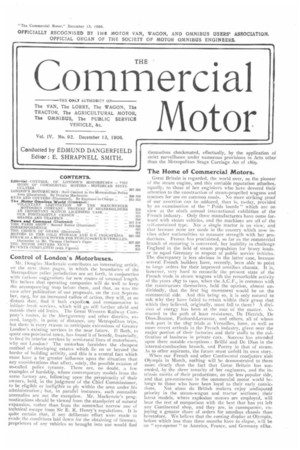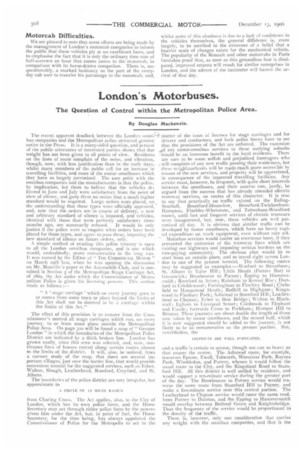Control of London's Motorbuses.
Page 1

Page 2

If you've noticed an error in this article please click here to report it so we can fix it.
Mr. Douglas Mackenzie contributes an interesting article, on the next three pages, in which the boundaries of the Metropolitan police jurisdiction are set forth, in conjunction with various suggestions for new routes of unusual length. We believe that operating companies will do well to keep the accompanying map before them, and that, as was the cae after publication of our proposals, on the 21st September, 1905, for an increased radius of action, they will, at no distant date, find it both expedieft and remunerative to initiate fresh services, which will go still further afield and outside their old limits. The Great ‘Vestern Railway Company's routes, in the Abergavenny and other districts, exceed, largely, in point of distance, any Metropolitan trips, but there is every reason to anticipate extensions of Greater London's existing services in the near future. If Bath, to quote one provincial town, has found it of benefit, financially, to feed its interior services by semi-rural lines of motorbuses, why not London? The motorbus furnishes the cheapest method of developing estates which lie on or beyond the border of building activity, and this is a central fact which must have a far greater influence upon the situation than any considerations that affect, solely, the possible evasion of so-called police tyranny. There are, no doubt, a few examples of hardship, where contemporary models from the same factory are, following upon the perspicacity of their owners, held, in the judgment of the Chief Commissioner, to be eligible or ineligible to ply within the area under his administration ; but, in parallel instances, such ostensible anomalies are not the exception. Mr. Mackenzie's prognostications should be viewed from the standpoint of natural expansion, rather than from the somewhat narrow one of technical escape from Sir E. R. Henry's regulations, it is quite certain that, if any deliberate effort were made to evade the conditions laid down for the obtaining of licenses, proprietors of any vehicles so brought into use would find
themselves checkmated, effectually, by the application of strict surveillance under numerous provisions in Acts other than the Metropolitan Stage Carriage Act of 1869.
The Home of Commercial Motors.
Great Britain is regarded, the world over, as the pioneer of the steam engine, and this enviable reputation attaches, equally, to those of her engin'eers who have devoted their attention to the construction of steam-propelled wagons and tractors for use on common roads. No more striking proof of our assertion can be adduced, than is, to-day, provided by an examination of the " Poids lourds " which are on view at the ninth annual international exhibition of the French industry. Only three manufacturers have come forward with steam vehicles, and the machines are all of the !:elf-contained type. Not a single tractor is on view, and that because none are made in the country which now invites other nationalities to measure strength with her productions. France has proclaimed, so far as the commercial branch of motoring is concerned, her inability to challenge England in the field of steam propulsion for heavy loads. or to equal Germany in respect of public service vehicles. The discrepancy is less obvious in the latter case, because several French builders have, recently, been able to point to large orders for their improved omnibus chassis. It is, however, very hard to reconcile the present state of the French trade in steam wagons with the remarkable activity of the years 1897 to 19oo, when the A.C.F., in common with the constructors themselves, held the opinion, almost undividedly, that the first big movement would be on the commercial side. And this being so, it is only natural to ask why they have failed to retain within their grasp that which they believed, originally, must fall to them? A division of energy has been at the root of the matter. Attracted to the path of least resistance, De Dietrich, De Dion-Bouton, Panhard-Levassor, and others, all of whom took part in the 1897 trials at Versailles, have, as well as more recent arrivals ill the French industry, given over the major portion of their factories and their staffs to the cultivation of business in private cars. Success has attended upon three notable exceptions : Brillie and De Dion in the internal-combustion branch, and Purrey in that of steam. As to other aspirants, the future must unfold its own story. When our French and other Continental coadjutors visit Olympia in March, nothing will be demonstrated to them more clearly than the fact that Great Britain has succeeded, by the sheer tenacity of her engineers, and the intrinsic merits of their productions, on the less popular side, and that pre-eminence in the commercial motor world belongs to those who have been loyal to their early convic tions. Not alone do British makers enjoy undisputed priority in the steam-wagon and tractor sections; their latest models, where explosion motors are employed, will bear the test of comparison with the best that has yet left any Continental shop, and they are, in consequence, enjoying a greater share of orders for omnibus chassis than heretofore. We believe that the coming display at Olympia, before which less than three months have to elapse, will be an " eye-opener " to America, France, and Germany alike.
Motorcab Difficulties.
We are pleased to note that some efforts are being made by the management of London's motorcab companies to inform the public that these vehicles ply at no exorbitant fares, and to emphasise the fact that it is only the ordinary time rate of half-a-crown an hour that comes amiss to the mcytorcab, in comparison with its horse-drawn competitor. There is, unquestionably, a marked hesitancy on the part of the everyday cab user to transfer his patronage to the motorcab, and, whilst some of this aloofness is due to a lack of confidence in the vehicles themselves, the general diffidence is, more Largely, to be ascribed to the existence of a belief that a heavier scale of charges exists for the mechanical vehicle. The popularity of the Renault and other motorcabs in Paris furnishes proof that, as soon as this groundless fear is dissipated, improved returns will result for similar enterprises in London, and the advent of the taximeter will hasten the arrival of that day.


























